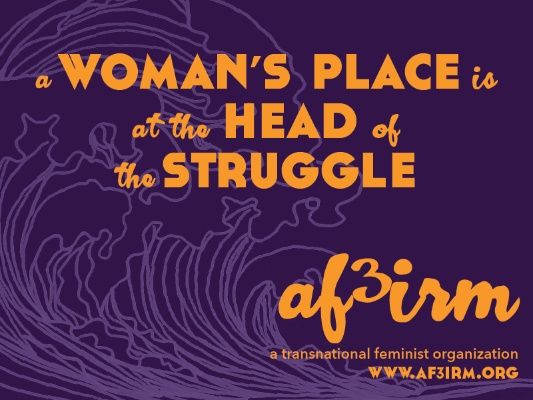Jollene Levid aims to live by a succinct but deeply powerful mantra: “A woman's place is at the head of the struggle for the liberation of all humanity!”

And she’s not alone. This belief has been the cornerstone of 25 years of women’s organizing through AF3IRM, an anti-imperialist transnational feminist organization with 9 chapters worldwide. Levid, a second generation Filipina-American social worker and union organizer who hails from Los Angeles, has been involved in AF3IRM for 13 years and is currently the organization’s national chair.
AF3IRM - the Association of Filipinas, Feminists Fighting Imperialism, Re-feudalization, and Marginalization, formerly Gabriela Network (GABNet) - unites a diverse, multi-ethnic, woman-identified, militant grassroots movement fighting for immigrant/migrant women’s rights and an end to human trafficking and militarism. For Levid, getting involved in AF3IRM was transformational.
“I came to this organization as a young survivor of domestic, sexual violence and have never left,” she told teleSUR. “AF3IRM saved my life and taught me how to fight back.”
It was an important time for Levid personally and politically. “I became a feminist because I had to,” she explained. “I had recently gotten out of a very abusive relationship. Before I was out of my teenage years, I had already experience domestic, verbal, emotional, psychological, and sexual violence from my intimate partner, my ex-boyfriend … AF3IRM helped me articulate all the anger, the passion, the issues that were built up inside me. My feminism grew up in AF3IRM.”
Her feminism continues to grow as she draws inspiration from women on the front lines of struggle across the globe resisting transnational oppression, from American street artists to Kurds in Rojava to Palestinians resisting occupation. “I am driven by discovering new women role models because I believe my feminism is constantly evolving,” explained Levid.
#TBT to our last march/rally on Intl Women's Day in 2008, because conditions have worsened since then. #WhyWeMarch8 pic.twitter.com/qqrXaIfDCC
— AF3IRM (@AF3IRM)
febrero 26, 2015
Having previously organized in a movement where she felt isolated when it came to women’s issues despite having common ground with others about race and class, Levid felt she joined an organization of women who shared her experience when she found AF3IRM. Through those connections, Levid came to understand her own experience and that of other women who have gone through similar situations in a way that was empowering rather than demeaning, which proved to be a formidable foundation for community and movement building.
“Collective traumas,” said Levid in a speech at AF3IRM’s National Summit last year, “have informed and inspired our resistance.”
And indeed, the movement is purposefully crafted and focused, developed out of a particular intersectional analysis of race, class, gender, and sexuality that comes from the experience of transnational women of color.
“AF3IRM is the first organization to purposefully put transnational feminism into practice,” Levid told teleSUR. “AF3IRM has set out to practice a feminism that builds deeply in our local communities and horizontally across national borders, recognizing our differences and organizing while being conscious of this.”
This shapes the transnational feminist perspective of AF3IRM, which is crucial to the movement because it fundamentally differentiates it from white, liberal feminism. Such mainstream, white feminist movements center goals of gender equality while failing to acknowledge the vastly different forms of oppression felt by transnational women of color, whose lived experience demands nothing short of feminist liberation, according to Levid.

This starting point has led AF3IRM to carry out campaigns and direct action focused on radical demands that cut across issues of gender, race, class, imperialism and women’s subjugation worldwide. Over the years, AF3IRM has: organized national marches against U.S. war and occupation; participated in May Day actions advocating the rights of immigrant and working class women; campaigned against police brutality and demanded justice when it was systematically denied to people of color; created summer schools for women’s and youth activism; broadcast its feminist voices over the airwaves of its very own Red Feminist Radio; supported countless survivors of sexual assault and other forms of gender-based violence; organized women-centered art and cultural shows across the U.S.; and much more.
By challenging liberal feminist calls for “mere equality,” AF3IRM’s feminist analysis cuts much deeper, prying into the colonial and capitalist system through which systematic gender oppression works, particularly against women of color.
“Our ideas, out theories, our leadership have been purposely destroyed, erased, silenced from the time the first conquistadors stepped foot in our families’ countries of origin - from Mexico to the Philippines, Peru to China, Somalia to Puerto Rico, all over indigenous lands in Canada and the United States. Here and abroad,” said Levid in her Summit speech. “That is deliberate.”
For Levid, given this structural violence that was essential in creating the racist, patriarchal, heterosexist, and class-based world we have today, it is only natural that transnational women of color must be leaders of the struggle to transform and liberate society. And doing so, these women are continuing a history and tradition of resistance they have always had.
Frm today's shoot for Grammy-nominated, #AnaTijoux's music video ANTIPATRIARCA. A woman's place is in the STRUGGLE �� pic.twitter.com/KdP0eT9msP
— AF3IRM (@AF3IRM)
febrero 22, 2015
Rejecting the mainstream narrative that conceives of “feminism” being born with the “First Wave” feminism of white suffragettes and only incorporating women of color in the subsequent “Third Wave” when white middle-class feminists realized the limitations of their movement, Levid centers the history of transnational women. “We are not ‘one wave’ of feminism,” she declared. “We have always made waves in our communities, in our movements.”
In AF3IRM, the power and potential of transnational feminism is making these waves so that they go deeper than platitudes of equality and instead call for transformational change. Only radical movements that fundamentally challenge the status quo and center not only women, but particularly women of color who have been and still are disproportionately marginalized while white women make advances within the confines of the capitalist system - can achieve revolutionary emancipation.
But in the process, too often feminism is relegated to the sidelines, seen as secondary to revolutionary priorities or as a “bourgeois” luxury that detracts from class struggle, observed Levid.
“What I think these leftists forget,” explained Levid, “is that the subjugation of women came before class society. It was in fact necessary to create it. So I believe that therefore, women’s oppression has to be centrally addressed in order for any revolutionary movement to succeed.”
Just as feminism must be revolutionary, revolution must be feminist. Transnational feminist.
And how can we defend and reclaim that feminism from liberal and corporate co-optation, and ensure it is truly revolutionary? In Levid’s words: “We can take to the streets!”
On March 8, AF3IRM will mark International Women’s Day with a mass grassroots rally in Los Angeles, led by women of color from diverse communities. AF3IRM invites all women to participate transnationally by sharing the reasons why they struggle and why they join International Women’s Day marches and events with the hashtag #WhyWeMarch8.